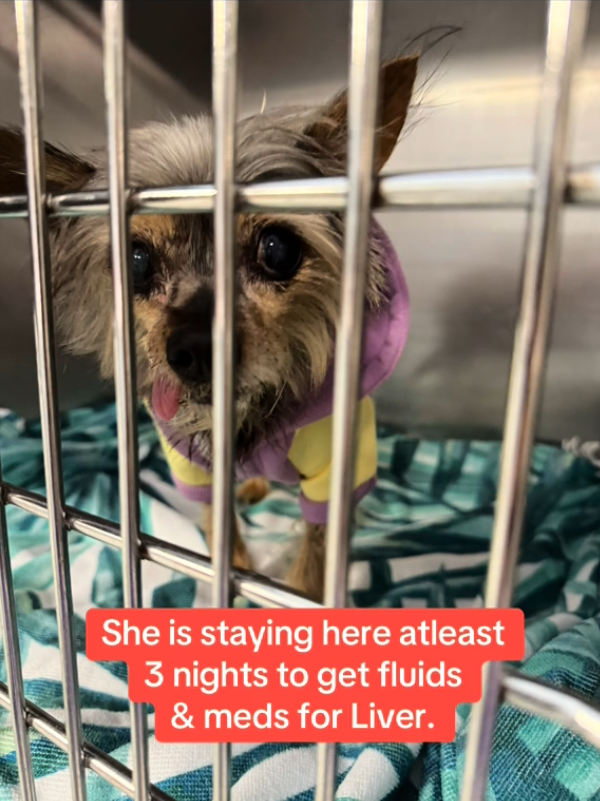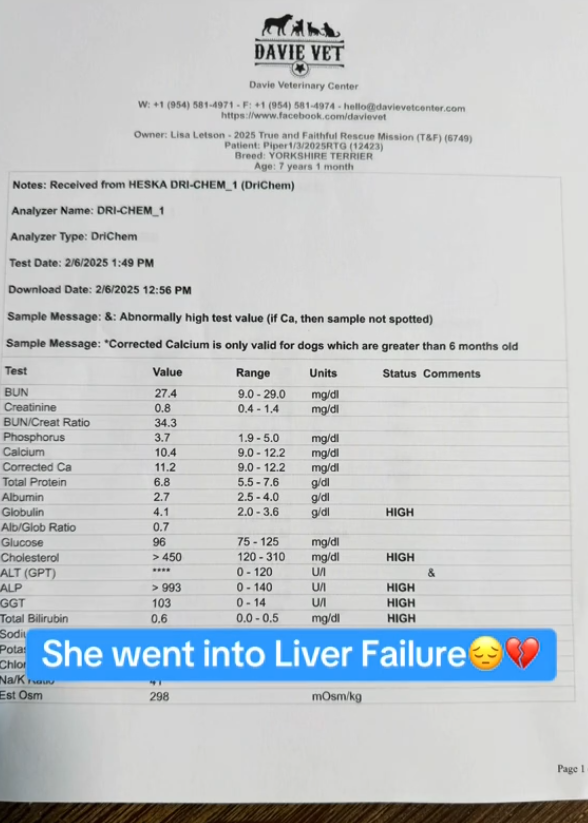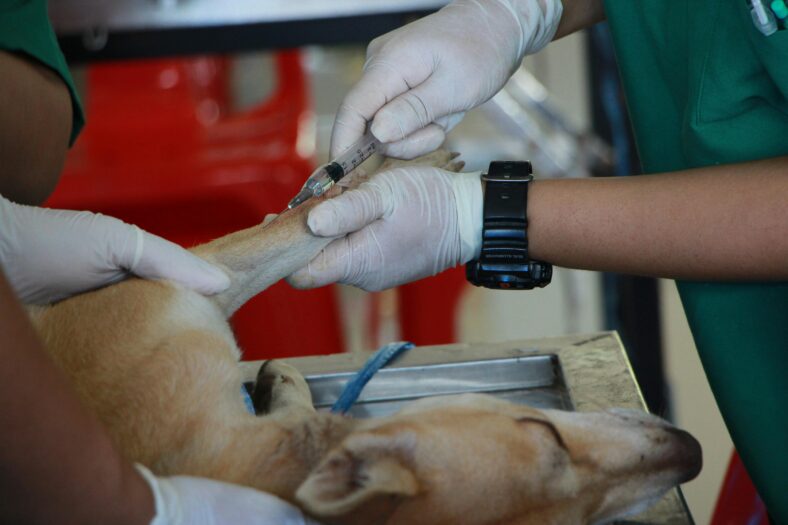Senior Yorkie Was Just About to Be Adopted—Then She Collapsed and was Rushed to the ER
Piper, a sweet senior Yorkshire Terrier, was on the brink of a happy new beginning when tragedy struck. Just before her adoption, she was rushed to the emergency room with liver failure, turning what should have been her best day into a heartbreaking fight for survival. (Watch the TikTok below)
A resident of True & Faithful Pet Rescue Mission in Venice, Florida, Piper is now receiving critical medical care. She spent three days in intensive care, fighting for her life with the help of lifesaving fluids and medications. Despite the setback, the rescue remains hopeful to not only save Piper but give her another chance at happiness.
@trueandfaithful Piper was so close to her happily ever after… 🥺💔 Instead of going home, she ended up in the hospital fighting for her life. 💔 This sweet Yorkie was just about to be adopted when she suddenly went into liver failure. Now, she’s spending three days in intensive care, receiving lifesaving fluids and medications. Her bill is $2,800, and we can’t do this without you. Every dollar brings her closer to recovery and the second chance she deserves. Please donate, share, and send Piper all your love. Let’s get her back on her paws and into the loving home that was waiting for her. 🐶❤️ #yorkied #rescuedog #sanctuary #florida ♬ someday i'll get it – Alek Olsen
Rescue In Need of Donations
Little Piper, a 7–8-year-old Yorkshire Terrier weighing just 9 lbs, is fighting for her life. Her hospital bills have reached $2,800, and the rescue urgently needs donations to continue her care and help other dogs in need.
The sooner Piper receives the treatment she requires, the sooner she can find her forever home and experience the love she deserves. She’s a sweet, sun-loving pup who adores humans, gets along with small dogs, and even tolerates cats.
If you’d like to help Piper and other rescue dogs, consider donating—every dollar makes a difference in saving lives. Go to this link to make your donation.

What is Liver Failure in Dogs?
Piper’s liver failure put an obstacle in her dreams of going to her forever home. But what exactly is liver failure in dogs? Dr. Michael Kearley, a veterinarian at PetMD explains, “Liver failure in dogs is a medical emergency. This condition is painful and can result in death.”
Dogs diagnosed with end-stage liver failure (cirrhosis) often have a poor prognosis, with many succumbing to the condition within one week. Those with accompanying ascites (fluid buildup in the abdomen) face an even poorer outlook.
While liver failure can be devastating, some causes can be treated and even reversed if diagnosed and addressed promptly by a veterinarian. Early intervention is crucial to improving outcomes and saving lives.
Liver Failure in Dogs Symptoms

As listed by Dr. Kearley, here are the major signs of liver failure in dogs:
Early Symptoms
- General Malaise: Weakness, decreased appetite, and weight loss
- Gastrointestinal Issues: Vomiting (with or without blood), diarrhea (with or without blood), and abdominal pain
- Increased Thirst and Urination: Polydipsia and polyuria
Advanced Symptoms (Liver Failure)
If liver disease in dogs progresses to liver failure, the following symptoms may occur:
- Jaundice: Yellowing of the skin, eyes, and mucous membranes
- Bleeding Disorders: Bruising, bleeding from the nose, mouth, rectum, and bladder, and black, tarry stools
- Fluid Accumulation: Ascites (fluid buildup in the abdomen) and edema (swelling of the limbs)
- Neurological Symptoms: Hepatic encephalopathy, characterized by seizures, behavioral changes, walking in circles, lack of coordination, lack of vision, and even coma.
A dog parent, u/Organic_Hornet4577, shared on Reddit how their dog developed liver failure and what were the clinical signs. They wrote, “My dog had bloodwork done two weeks ago all came back normal but a couple of days ago he started throwing up, was lethargic, had no appetite, not sleeping well. Took him to the vet today and got a call he’s having liver failure.”
What Causes Liver Failure in Dogs?
Diagnosing the cause of liver failure in dogs can be a challenging and frustrating process for veterinarians. In some cases, the initial cause may never be identified.
Despite the difficulties in diagnosis, there are several known causes of liver failure in dogs. Certain medications, such as Tylenol (acetaminophen), can be toxic to dogs and cause liver damage. Heavy metals like copper can also accumulate in the liver and lead to failure.
Toxins are another common cause of liver failure in dogs. These can include blue-green algae, mycotoxins found in moldy or spoiled food, xylitol, sago palm, and rodenticides.
Infectious organisms causing viral infections, bacterial infections, and parasitic infections, such as infectious canine hepatitis, leptospirosis, histoplasmosis, and heartworm disease, can also cause liver failure in dogs. Cancer is another potential cause, as are inherited conditions like copper storage disease and amyloidosis. Certain breeds, such as Bedlington Terriers and West Highland White Terriers, are more prone to these conditions.
Finally, portosystemic shunts, usually a congenital issue, can also lead to liver failure in dogs.
Diagnosing Liver Failure in Dogs

“Since symptoms of liver failure in dogs can be vague, vets rely on diagnostics such as bloodwork and urinalysis as well as a physical exam,” according to Dr. Kearley.
These initial tests help identify potential liver problems and guide further diagnostic steps. Bloodwork, in particular, can reveal abnormalities in liver enzymes, which can indicate liver damage.
Depending on the results of the initial tests, your veterinarian may recommend additional diagnostic tests. These may include advanced blood tests, X-rays, ultrasound, and abdominocentesis. Abdominocentesis is a procedure where a needle is inserted to collect fluid for analysis, which can help identify evidence of infection or cancer.
In some cases, a liver biopsy may be necessary to confirm the diagnosis. This involves collecting a sample of liver tissue, which can be done through surgery or a needle biopsy. However, liver biopsies carry risks and are usually performed after the patient has been stabilized.
Liver Failure in Dogs Treatment
Effective treatment of liver failure in dogs relies on early intervention. This is particularly crucial for acute liver failure in dogs because these canines often require critical care. Dr. Kearley states, “The goal of treatment is to slow the disease and allow time for the liver to regrow.”
The following treatment options can help in addressing the underlying cause and alleviating the symptoms through supportive care:
Medications
Treatment may involve administering medications, such as SAMe, milk thistle derivatives, N-acetylcysteine, and Vitamin K1. IV fluids with electrolyte and glucose supplementation may also be necessary.
Pain Management
Pain medications, antacids, anti-nausea medications, and gastroprotectants may be prescribed to manage symptoms and improve the dog’s comfort.
Dietary Management
A diet that minimizes liver workload can be good for the dog. Prescription diets like Hill’s l/d, Royal Canin Hepatic, or Purina HP Hepatic are formulated with easily digestible protein and higher antioxidant content.
Protein Restriction
For dogs diagnosed with hepatic encephalopathy or at risk of developing it, protein restriction is crucial. Additional treatments may include enemas, lactulose, and antibiotics.
Cirrhosis and End-Stage Care
For dogs with cirrhosis, treatment focuses on slowing disease progression, managing complications, and maintaining quality of life. In some cases, humane euthanasia may be recommended by your veterinarian.
Frequently Asked Questions (FAQs)
What is sudden liver failure in dogs?
According to The Goody Pet, sudden liver failure, or acute liver failure, occurs when the liver rapidly loses 70% or more of its function due to chronic hepatic necrosis, which means severe cell death in the liver. Common causes include toxins, certain drugs or chemicals, respiratory failure, and heatstroke. If left untreated, this condition can be fatal, making prompt veterinary care essential.
What is liver disease in dogs?
Liver disease in dogs refers to conditions that cause the liver to malfunction or stop working properly, as per Dr. Jennifer Kvamme and Dr. Veronica Higgs. Chronic liver disease is a long-term condition characterized by ongoing liver damage and inflammation. Symptoms of liver disease include jaundice, vomiting, diarrhea, weight loss, and abdominal swelling. Diagnosing liver disease typically involves physical examination, blood tests, imaging studies, and liver biopsy.
Can dogs survive with liver failure?
Dogs with liver disease and liver failure can have a good prognosis and normal life expectancy if caught early and treated aggressively, thanks to the liver’s unique ability to regrow. However, chronic liver disease can develop, requiring lifelong medical and dietary management, frequent check-ups, and potentially impacting quality of life.
















